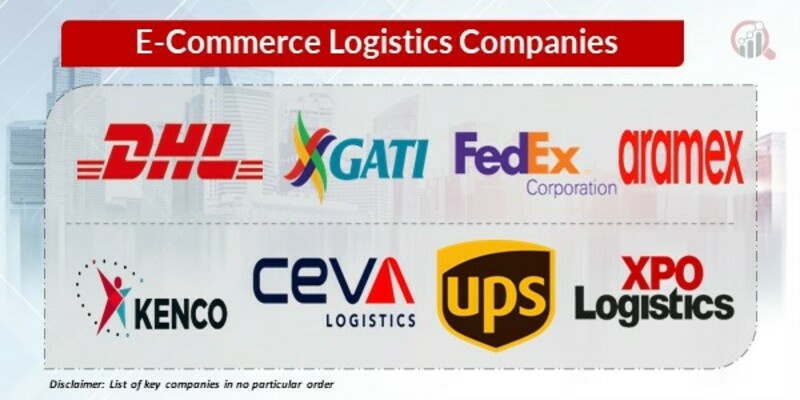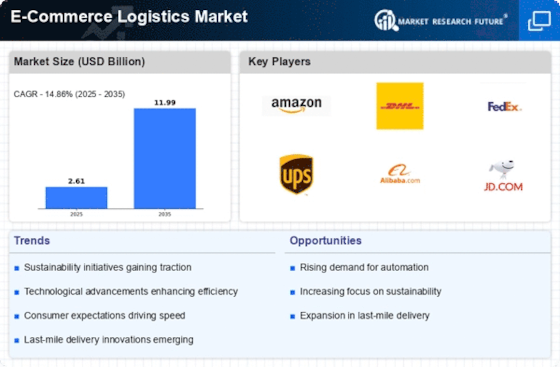Top Industry Leaders in the E Commerce Logistics Market
 The e-commerce logistics market is a booming battlefield, a fast-paced arena where established giants and nimble startups clash for market share. With the e-commerce juggernaut showing no signs of slowing down, the stakes are higher than ever for players striving to deliver faster, cheaper, and more seamlessly.
The e-commerce logistics market is a booming battlefield, a fast-paced arena where established giants and nimble startups clash for market share. With the e-commerce juggernaut showing no signs of slowing down, the stakes are higher than ever for players striving to deliver faster, cheaper, and more seamlessly.
Strategies Fueling the Fierce Battle:
-
Fulfillment Network Expansion: Building comprehensive fulfillment networks closer to consumers is a key strategy. Players like Amazon and JD.com invest heavily in warehouses and distribution centers, while companies like Shipt and Deliverr partner with local retailers for hyper-fast deliveries. -
Technological Prowess: Automation and AI are transforming the game. Warehouses are adopting robots and automated sorting systems, while companies like Locus Robotics and Fetch Robotics offer robotic fulfillment solutions. AI optimizes routes, predicts demand, and personalizes deliveries. -
Subscription Services: Offering subscription models for guaranteed fast delivery or unlimited deliveries is gaining traction. Amazon Prime and Flipkart Super Plus are prime examples, attracting and retaining customers with convenience and value. -
Sustainability Focus: Green logistics solutions are becoming increasingly important. Electric vehicles, carbon-neutral packaging, and route optimization are being adopted to reduce emissions and cater to environmentally conscious consumers. -
Strategic Partnerships: Collaborations are crucial for expanding reach and expertise. Logistics players partner with e-commerce platforms, airlines, and retailers to offer integrated solutions and tap into new markets.
Factors Dictating Market Share Dominance:
-
Delivery Speed and Reliability: Meeting and exceeding customer expectations for fast and reliable deliveries is paramount. Same-day and hyper-local deliveries are becoming the new battleground. -
Cost Efficiency: Finding the sweet spot between speed and cost is crucial. Optimizing routes, utilizing technology, and negotiating bulk deals with carriers are key strategies. -
Scalability and Flexibility: Adapting to fluctuating demand and new market trends is essential. Cloud-based solutions and modular infrastructure enable logistics players to scale up and down efficiently. -
Customer Experience: Providing a seamless and personalized experience throughout the delivery journey is key. Real-time tracking, proactive communication, and easy returns are crucial differentiators.
Key Players
- DHL International
- Gati Limited
- Fedex Corp.
- Aramex International
- Kenco Group
- Ceva Holdings
- United Parcel Services
- XPO Logistics
- Clipper Logistics, among others
Recent Developments :
In August 2023: Alibaba announced that it would be investing $15 billion in its logistics infrastructure over the next three years. The investment is aimed at making Alibaba's logistics network more efficient and sustainable.
In August 2023: UPS announced that it would be acquiring Parcelforce Worldwide, the UK's second-largest parcel delivery company. The acquisition is expected to give UPS a stronger foothold in the European e-commerce market.
In February 2022: Singapore Airlines and DHL company went into a partnership for expansions of the business partnership for enhancing the logistics opportunities.
In January 2022: I-Power company announced its launch of new E-commerce logistics along with the Box Harmony company. For this joint venture, iPower will promote $50,000 for a 40% equity interest in the JV with an option to purchase up to an additional 20%.










